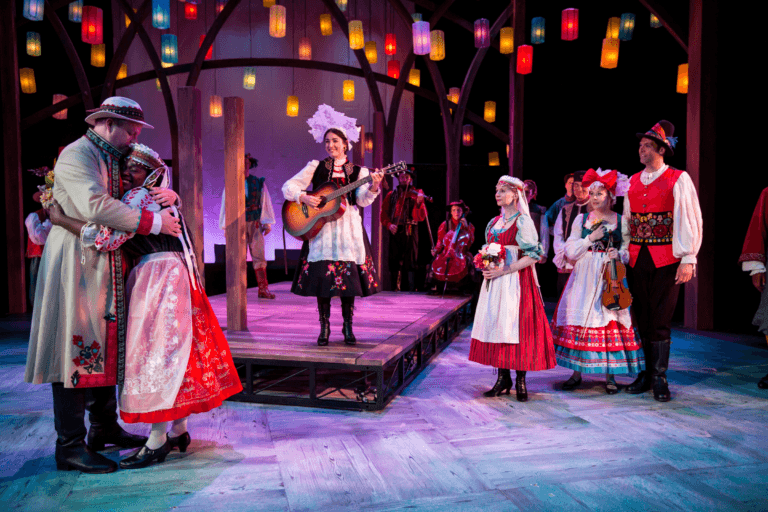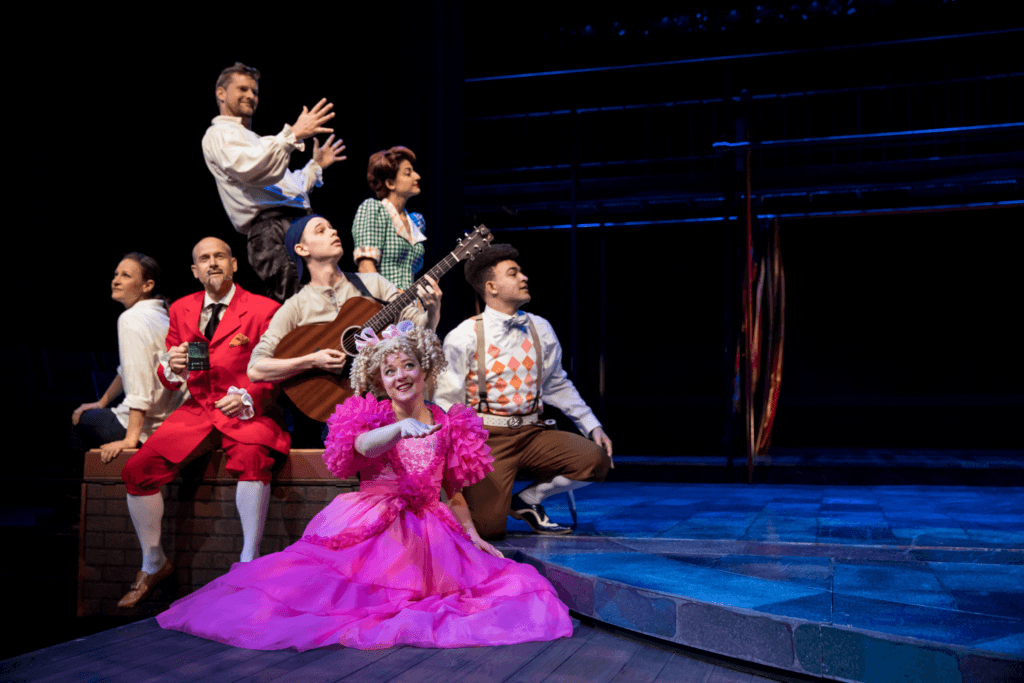Great River Shakespeare Festival

Top photo taken by Dan Norman
In 2002, a few Shakespeare enthusiasts at the Guthrie Theater started talking about forming a company dedicated to the plays of William Shakespeare. The city of Winona, a town nestled on the bluffs on the Mississippi River about two hours southeast of the Twin Cities, loved the idea of something that would broaden its cultural base, draw visitors, and act as an economic driver for local businesses. A couple of years later, Winona hosted the first Great River Shakespeare Festival. This coming year Winona and the Great River Shakespeare Festival will host the 17th season, which is expected to draw over 10,000 audience members.
“We hear a lot from dead white men writers, and so one of things we’re looking at as we’ve progressed is what voices are we inviting into the festival and how are we representing diverse voices?”
Aaron Young, Managing Director, Great River Shakespeare Festival
A Door to Shakespeare and New Playwrights on the Mississippi Bluffs
The Great River Shakespeare Festival is a nonprofit, professional theater company dedicated to dynamic, clearly spoken productions of Shakespeare’s plays. While the first couple years of the festival performed exclusively Shakespeare plays – typically one comedy and one tragedy – for many years they’ve also included additional productions by contemporary and emerging playwrights. “We hear a lot from dead white men writers, and so one of the things we’re looking at as we’ve progressed is what voices are we inviting into the festival and how are we representing diverse voices?” asked Aaron Young, the Festival’s Managing Director.
Aaron joined the company in December 2016. With over two decades of experience producing theater, he was initially drawn more to the theater work itself rather than a deep love of Shakespeare. “My experiences with Shakespeare had not been positive,” Aaron admitted, who came from a musical theater background. He was pleasantly surprised in his first season when he felt the performances drawing him into the stage in a way that reminded him of what he loved about the world of musical theater. “A lot of it has to do with how this company approaches Shakespeare, which is very much about making sure it is understandable and relatable,” he explained. Aaron has come to appreciate the humanity that Shakespeare gave all of his characters, whether nobility or gravedigger. “The great thing about Shakespeare is he makes all of his characters fully human.”
In addition to having access to top-tier acting, classic storylines, and new playwrights, Winona has realized the economic boost from the festival the city leaders had hoped for. “We hear regularly from businesses about their numbers being wholly dependent on the festival in the summer, and it’s very gratifying to hear that, to know that we’re supportive of the local business community,” said Aaron. The nonprofit also has a storefront in the downtown shopping district where they sell quirky Shakespeare goods and have costumes on display, all in an effort to remind people that this Festival is a year-round production. They also bring teaching artists into classrooms to work with students studying plays like Romeo and Juliet, to bring these works to life and show teenagers how relevant Shakespeare can be.

In turn, the community has fully embraced the Festival. “It’s part of the culture of Winona to be curious of the people who are here,” said Aaron, who knows the residents feel like the actors and directors who come in for the Festival are part of the community. “They’re here for a good part of the year, they get involved and volunteer, and the community likewise invites them into their homes, they’re part of their families. I don’t know that that would happen in a larger community.”
Working Capital to Bridge State Arts Board Funds
Like many arts nonprofits in Minnesota, the Great River Shakespeare Festival receives funding through the Minnesota State Arts Board (MSAB), funding made available through the Legacy Amendment. However, rather than being paid out all at once, the MSAB award is disbursed monthly starting in the fall. The theater company’s cash flow needs are greatest during the festival season, from July into the fall. After hearing about Propel Nonprofits through free webinars, Aaron and the team decided to reach out for a working capital loan to bridge the MSAB funds.
These general operating grants from MSAB had become especially important for the Great River Shakespeare Festival given a decline in larger grants from private foundations. “The interesting thing is contributed revenue has been growing since I’ve been here, but when I look back at the records, there were these big, six-figure foundation grants on a more regular basis, and those kind of just stopped several years ago,” Aaron noted. So, beyond a cash flow solution, he knew the organization needed to get more strategic in how it sustained its work going forward.
“For me, a big plus was I felt like Propel was really a partner with me, and looking not just at our cash needs, but really at how we organize into the future,” said Aaron. “We partnered with Koa [Mirai, a Propel Loan Officer and Financial Specialist] to figure out what that means for the size of our organization and how we needed to adjust our expectations of the future so we can maintain a good cash situation.” That has meant focusing on what’s most important – in their case, the actors – and amplifying and cutting accordingly. It increased its costume budget and team while cutting back on set, lighting, and sound. The nonprofit has also been strategic in hiring staff that can wear multiple hats. It’s hard work, but Aaron knows it’s necessary to uphold the nonprofit’s mission.
The 2020 Festival

Tickets are already on sale for the 2020 Festival. Aaron is especially excited to bring back Taming of the Shrew, even though last time it was not well received given the archaic gender dynamics that felt even more revolting in the age of #MeToo. Instead, the Festival team decided to present the show differently. “All genders will be reversed so we can look at gender relationships through a completely different perspective and see how that affects the ending of the show,” explained Aaron. And, for the first time, the acting company has equal gender parity, after a few years of experimenting with more women playing male roles and receiving no pushback from audiences.
Learn more about the Great River Shakespeare Festival and get your tickets for the 2020 season at its website: http://grsf.org/
